
A digital marketing audit is one of the most important pieces of work your business can have done for it, but is so often overlooked or wildly misunderstood. To help demystify the audit and what it could contain, I’ve put together lessons from the last 10+ years of my experience; including insights into our digital marketing audit service at Footprint Digital.
Contents
What is a (Digital) Marketing Audit?
What’s the Difference Between a Good & Bad Audit?
Different Audit Components:
- (Google) Analytics Audit,
- SEO Audit,
- Paid Search Audit,
- Content Audit: Content success; appropriateness; and accuracy.
- UX (User Experience) Audit.
Marketing Audit Examples,
Audit Tools,
Quick Audit FAQs.
What is a Digital Marketing Audit?
A digital marketing audit is an inspection of your brand’s marketing activity. It compares how it is now against how it was. Think of it as an investigation into what’s working, what isn’t working, and ultimately where marketing activities can be improved.
What’s the difference between a Digital Marketing Audit and a Marketing Audit?
Audits can vary wildly depending on many factors – we’ll explore these below. The difference between a marketing audit and a digital marketing audit is pretty important to consider early on. There are two takes on this here:
- marketing and digital marketing are the same things.
- “digital marketing” has particular requirements based on it focusing on all online efforts.
A marketing audit without a digital focus will be unfit for purpose—digital is inescapable! Yet, a digital marketing audit – too blinkered by the online world – may miss key details

We approach a digital marketing audit (DMA) as a thorough-yet-agile method of appraising the digital footprint of a brand. The audit’s focus is mainly online as the traces of a brand are far-easier to locate, no matter how poorly the tracking/monitoring by that brand has been.
The premise for our digital marketing audit is simple. It forms the basis of your digital marketing strategy for one simple reason: how do we know where your brand or businesses needs to spend its time, unless we understand what’s working or not working right now?
What’s the Difference Between a Good and Bad Audit?
You can base the audit’s effectiveness or “value” on several different elements. But this isn’t one-sided. It’s not solely down to the company or the individual doing the auditing.
From the customer’s perspective, the value is found in:
- A more holistic audit – A truly great audit will tell you things you’re not aware of. If you request something too specific as part of the audit, you may hamper the findings by setting a narrow brief.
- Your willingness and ability to put recommendations into practice – You won’t realise the benefits of an audit until you action the recommendations. Most audit recommendations are likely to incur time and resources to fix.
- How open you are when receiving audit recommendations – In the vast majority of cases, an expert conducts the audit, which means you’re likely to see recommendations you wouldn’t have expected. Ask for more information if you need it, but be prepared to change your own beliefs about the current situation. Ultimately, your audit investment pays for expert insight, so be ready to accept their findings.
From the auditor’s perspective, the value is found in:
- The ability to draw from several relevant data sources – An audit needs to gather relevant data about a website (albeit with different focuses), the quality of the decisions and insights is directly related to the quality of the data.
- The ability to make insightful recommendations from the data – Data alone isn’t an answer, and an audit without insights from data will be hard to work with and may be no help at all.
- The ability to effectively prioritise and present these recommendations – If audit recommendations will take time and effort to implement (see above), it makes sense if the audit takes out some of the sting. The audit should prioritise these recommendations and helping the customer make the best, informed decisions.
- The ability to manage the customer’s expectations throughout – What will and what won’t the audit cover? And how can this information be used? Too often, agencies don’t present an audit as the start of a journey, to their detriment.
But the only real way to judge whether an audit is good or bad is relative to the objectives and statement upfront. There are many elements a digital marketing audit could cover – there are thousands of data-points which can be collected and analysed, but they will not all be within scope. Everyone needs to understand what’s in the audit right from the get-go. Remember, education is key.
Different Audit Components
There are many components to an audit. You’re unlikely to find two audits run by different companies which are identical. The form of an audit and what it contains really depends on your goals.
Typically, audits will be:
- Broad and shallow
- Narrow-yet-deep
Broad and shallow audits are typically designed to help make strategic-level decisions by looking across many different elements and accessing performance. These work best when you don’t know the issue you need to solve or need a fresh take on the digital landscape as a whole.
“Shallow” may feel like a negative to some. Yet, providing you know the right elements to review, the process can be agile, and you can start working on the actions more quickly.
Narrow-yet-deep audits start with the understanding of you know where your problem lies, or at least you know where you want to spend your time and budget implementing the fixes. The depth of these audits can provide some near-forensic insights, but if you direct your effort in the wrong direction, you can impact your effectiveness.
How do you know if you need a broad audit across your digital footprint or a deep-dive into a particular channel of your marketing efforts? This knowledge requires a degree of expertise, and a level of consultancy, first. This is a crucial question – you should not speed into a decision unless you’re sure.
(Google) Analytics 4 Audit
The reason auditing your Analytics is first on this list is a critical one. If you’re not confident you’re tracking what matters, any insight from the audit may be compromised. Who wants to make business decisions with bad data?
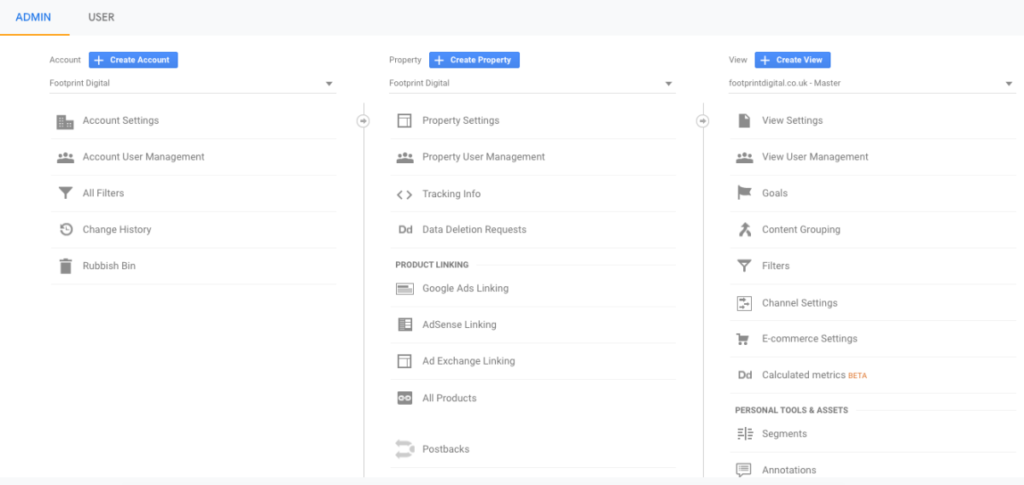
Auditing analytics data doesn’t have to be with Google Analytics 4 specifically, however, in the vast majority of cases (<99% of sites I’ve worked on) Google will be the master method of tracking. The principles of what you need to check are the same either way, here are some of the elements an audit like this would look at.
- Is the basic page tracking working correctly?
- Are the account settings configured correctly (right currency, spam bot filtering, correct user access)?
- If your website is eCommerce, are transactions being tracked?
- Have you got the right conversion events set up?
- Are you filtering out your own internal traffic from the reporting view?
Take a look at our Google Analytics 4 Guide for help with these questions.
These cover the basic-yet-essential points that the majority of Google Analytics accounts miss. An audit like this would usually go further and then dig into the following:
- Where are your customers?
- What devices are they using to access your website?
- Which marketing channels are working the best?
- Which pages are likely causing users to exit the site prematurely?
- Which are your top-performing pages?
This list is only really a short example of what you can find in a Google Analytics audit – there are many other variables.
SEO Audit

An SEO audit is one of the most common audits we get inquiries about – and it’s not hard to see why. Out of the digital marketing mix, SEO is often seen as the “go-to” method to get traffic to a website. But, SEO can be one of the most challenging to see success from if you are not working with strong foundations.
When we talk about an SEO audit, there are different types which have different areas of focus. There’s a/an:
- Technical SEO Audit – the emphasis being on the technical makeup of the website and how well search engines can crawl & index the content.
- “Off-page” (or link) audit – where you focus on the websites which link back to yours. Backlink audits used to be for people who suspected Google might have penalised them. Now we use them more for identifying opportunities to grow a backlink profile.
- Local SEO audit – This one is focused more on sites or businesses who are looking to rank for specific local-themed searches and in Google’s Map results.
- Content audit – I will go into content audits further on; however, an “SEO content audit” will often require a focus on optimising content with focus keywords. It’s not unusual to do this as part of a technical audit.
In reality, if you (the customer) are requesting a type of SEO audit, we would assume you have a level of knowledge and understanding already. If you don’t know which is most appropriate, it makes sense for you to give insight into your business goals and let the consultant decide the audit’s focus.
What you really need to look out for are specific recommendations, not just lists of errors and issues. The best audits begin to consider the CMS (Content Management System) your website is built on – if applicable – and prioritising changes based on the potential impact and difficulty.
Late last year I polled 1,061 SEOs on their audit priorities, which you can read about here.
Paid Search Audit
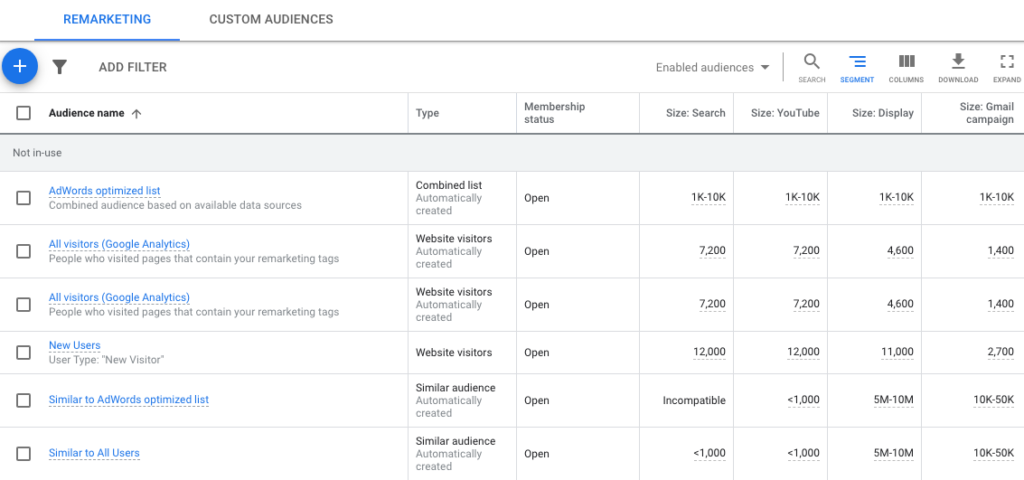
Paid search audits – much the same as SEO audits – come in a variety of types and with different focuses. Where you focus your time and effort depends on the channel and your eventual goal.
You can focus on:
- Google Ads or Bing ads – General account audits for Google and Bing ads follow similar principals. These can be some of the largest and most complex paid search audits—the amount of elements an audit can cover is vast. An audit here would look to check the account structure, bidding strategy, target keywords, audiences, time of day, device, location, ad copy, ad extensions and much, much more. Take a look at our PPC Account audit for more information.
- Google or Bing shopping – Shopping account audits often focus on similar elements to a standard Google or Bing ads account audit, but with some crucial differences. Your shopping account is nothing without a feed of your products. This feed needs to provide a comprehensive and error-free list of what you want to sell – and is a huge factor in getting a good return on ad spend. Typically, this kind of audit will look at the bidding strategy in conjunction with product prices, and (hopefully) profit margins, if the data is available.
- Facebook/Instagram Ads – Audits of Facebook’s ad platform tend to differ quite heavily from Google and Bing variations. The core principles are similar, yet the construct of the campaigns, method of targeting and types of creative are totally different. The Facebook ads platform also extends to Instagram, and the audit would look to compare and contrast the approaches for each platform. Finally, you should also check the Facebook tracking pixel set up – a sometimes daunting task that we increasingly see as mission-critical for the successful running of these campaigns.
There are other different ad platforms you may wish to audit, but these are the most common we see. I urge you to consider auditing a paid search account if any of the following are true:
- You haven’t done so for 6-8 months and don’t actively manage the account.
- If you’re introducing a new manager to the ads account.
- If you’re significantly worried about performance, but don’t know where to start working.
Some people feel that paid search is simpler than SEO (and in many ways it is); however, what works in one account for one person may not work in another. You feel the costs of an un-optimal paid search account instantly. You waste money with every inappropriate click or ad impression. Nobody wants that.
Content Audit
Perhaps the broadest of all of the audit types is the content audit. If you work with anyone within the marketing world, they will approach a content audit differently. We break audits down into three broad areas, but naturally, the scope of the audit depends on the goal.
Are you sensing a theme yet?
Content Success
If we were auditing content for “success”, we’d typically be looking at the content for its ability to generate traffic, links, shares and new business. If you are starting a new content strategy, this helps to ensure you are taking all the learning forward with you. In instances such as site migration, it could be catastrophic to leave behind your best performing content, this type of audit would see that this never happens.
Content Appropriateness
When we think about the appropriateness of content, we generally think in terms of how well it talks to the audience. Typically this kind of audit would be run by a copywriter who can get into the mind of the intended audience and can judge what has been written accordingly.
Content Accuracy
Lastly, accuracy – which can come in many forms, but spell check, sentiment analysis, and readability can all be focused on here.
Learn more about carrying out Content Marketing Audits
UX (User Experience) Audit
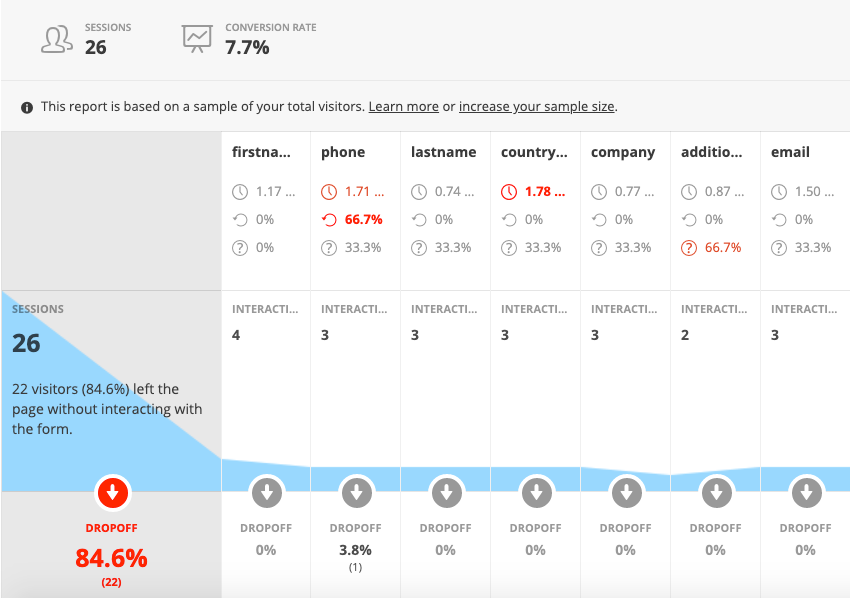
User experience audits focus on just that, the experience your user will have on your website. For this, you need to establish the goal of the site and then learn the journey in which users go on to complete it. What’s important here is that you’re auditing the experience for any points of friction and suggesting ways to remove them.
The audit will look at:
- Accessibility
- Mobile-friendliness
- Home page – first impressions
- Types of CTAs (call to action) used
- USPs (unique selling points) – how clear they are
- Service pages – how easy it is to understand the offering
- Contact pages – do you make it easy enough for people to get in touch?
We frame these against top-identified competitors as what “good” looks like in UX is relative to experiences elsewhere. Using competition to benchmark the ‘best’ in class is a great way to prioritise activities.
Marketing Audit Examples
Audits can end up as vast documents which can be quite dull to many (especially if the audit doesn’t impact you). But here are some audit examples to give you an idea of the kinds of information you can expect.
Analytics Audit Recommendations
Starting at the beginning of the process (where everyone should start), analytics and tracking have to cover a lot of essential ground.
Familiarise yourself with the optimum Google Analytics (GA) settings to ensure what you are tracking is accurate, and it is reporting all goals.
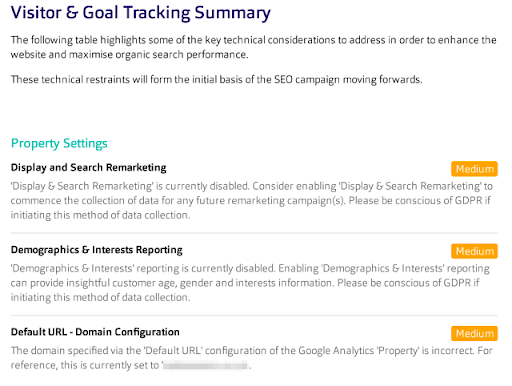
Tech SEO Site Audit Summary
A thorough tech-audit can check 200+ different elements of a site. An audit summary – like the one below – is designed to highlight the key areas for improvement.

This audit suggests that the site needs some attention to ensure that the quality of the build (“code and mark-up”) needs some attention. There are, however, several other areas which are still low – this site is an unhealthy one, from an SEO perspective.
Audit Recommendations
The audit recommendations contain a prioritised list of activities. This list is sorted by category depending on the area of the site it details.
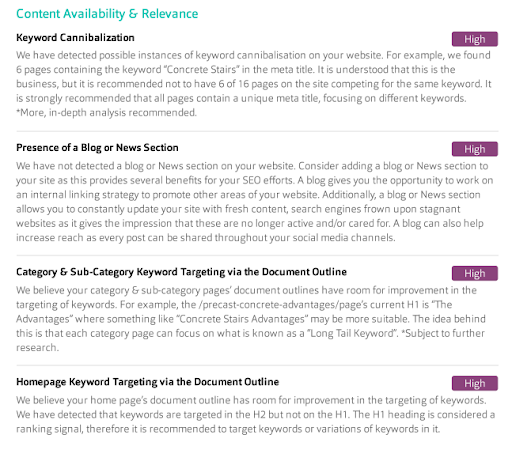
Priorities for different websites will always be different, and not all issues will be as severe. You cannot rely on machines to make this categorisation for you, as it can often throw up strange and ineffective recommendations.
Backlink Audit Summary
The backlink audit is perhaps the most data-laden. When you analyse good and bad backlinks, there are several different elements you need to review. Below is the audit summary, which gives the topline stats on the backlink profile.
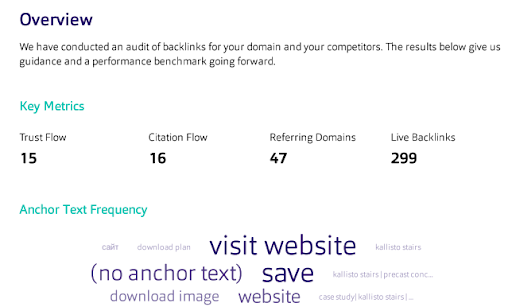
It is vital as part of this process to compare your website with the competition. After all, these are the people you need to beat.
Spell Check
So many people overlook spelling, but poor spelling on a website can put people off and colour the experience. You can uncover this information by thoroughly editing the site, but an automated report highlights the issues quicker.
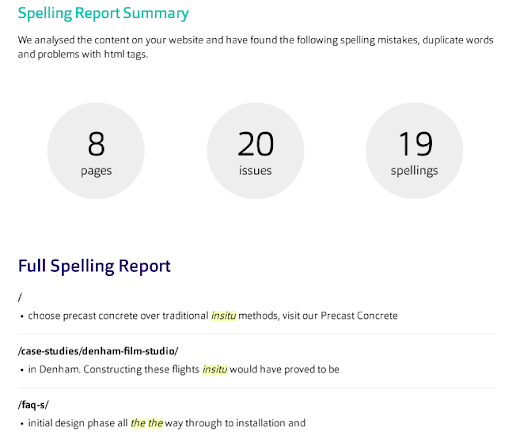
Contact form comparisons
This is a snapshot of the competitor comparison of a User Experience audit. We compare a screenshot of each of the websites (your site & five competitors) and summaries the key differences – what’s good or bad for each one.
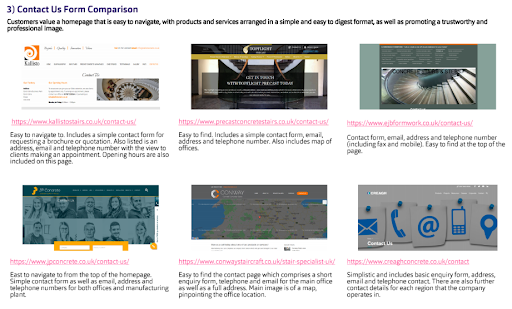
What Audit Tools are there?
Auditing tools is a vast area to cover; in fact, any type of audit you can imagine there’s a tool – or many tools – to do the job. What doesn’t exist is a tool which audits everything in one sweep – not possible.
We have spent some time fleshing out the tools we use to audit sites according to our own needs. We use custom-built spell-checkers, backlink auditors, amongst other things. But the need for tools and automation helps you use your time more wisely and add value.
One-click auditors that you encounter online aren’t all that helpful in the long-run. If you want to start the process yourself, here are some free and paid auditing tools that can begin the process.
SEO Audit Tools
- Screaming Frog (here) – A site analyser (crawler) that runs on your desktop.
- SISTRIX (here) – An SEO toolkit that provides a large number of tools to aid SEOs.
- OnCrawl (here) – A heavy-duty “cloud” based crawler – used for large-scale auditing for vast websites.
- Google Search Console (here) – Gain feedback on your website from Google, a free tool you use to audit your performance.
Off-Page Audit Tools
- Majestic (here) – Backlink checker.
- BuzzSumo (here) – Content success auditor (on social).
- Ahrefs (here) – Backlink checker (also content auditor).
Content Auditing Tools
- Copyscape (here) – Check to see if your content has use be copied elsewhere.
- Reading age checker (here) – Check to see how easy your content is to read.
- Google Analytics (here) – A free and powerful web analytics platform from Google.
While tools never make an audit, they make it easier. You need to take time to ensure the ones you select give you the data and insight you need.
Quick Audit FAQs
How much does an audit cost?
Audit costs are as wide-ranging as the types of audits, although our DMA (Digital Marketing Audit) starts from £750 (+VAT). Considering that, for us, the DMA is 20hrs of time, we consider it to be exceptional value.
Why is it priced that way?
We want everyone we work with to have one of these audits done, so we priced it at the lowest-barrier to entry.
We are often told it could be two or three times this cost.
But, by increasing price, we may end up excluding some businesses we want to work with.
How long does an audit take?
We can turn a DMA around in a week – depending on how many reports it will contain.
More intensive Technical SEO or Content audits can take two to four weeks depending on the size of the site and the complexity of the task.
Of our auditing tools and processes, only a handful are 100% automated, so we need to ensure one of the technical team is on hand to lead these projects. It’s worth the wait!
Why do I need a website audit?
Simply, if you don’t audit your website and overall marketing activity, do you really know where your time is best spent? The vast majority of businesses are limited by time, ensuring you’re effective with your focus is the most important thing.
A thorough audit will save money when considered against three, six, or twelve months of marketing activity.
Can I audit a website myself?
Absolutely, everyone should be running audits in some way, shape or form. However, brushing your teeth doesn’t make you a dentist, changing the oil in your car a mechanic or unblocking your drain a plumber.
A thorough marketing audit will need expertise from three-five different disciplines – experienced people who have trained to a high standard. The audit results will be far more favourable with their time and knowledge.
Will an audit solve my problems?
If you act on all recommendations in your audit, as part of an ongoing strategy, your problems will be solved. An audit is the start of a process and seldom the end of one. When you undertake one, be ready to put time and resources into taking action on the audit recommendations themselves.
The other thing you should also be aware of is that an audit will often ask questions it is unable to answer. These unanswerable questions shouldn’t be considered as a failure of the audit or a point of frustration. Sometimes the data/information will not be available.
For example, the majority of Google Analytics accounts we audit are not collecting the right information or the most accurate information. We can recommend how to fix this, but the data we would have otherwise used as part of the audit simply won’t be present.
You will always know more about your website and brand after an audit than you did before. And you can’t make a plan to grow or repair or build if you’re unaware of the issues. If you approach the experience with an open mind and a willingness to learn, it will be one of the most valuable things you do.
